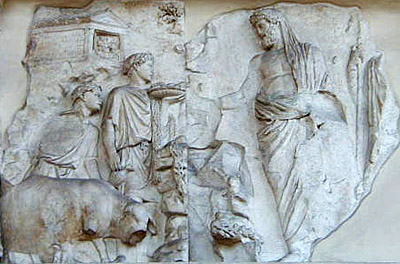

Propertius, Elegiarum Liber III.18 (translation)
Clausus ab umbroso qua tundit pontus Averno
fumida Baiarum stagna tepentis aquae,
qua iacet et Troiae tubicen Misenus harena
et sonat Herculeo structa labore via;
hic ubi, mortalis dexter cum quaereret urbes,
cymbala Thebano concrepuere deo--
at nunc invisae magno cum crimine Baiae,
quis deus in vestra constitit hostis aqua?--
Marcellus Stygias vultum demisit in undas,
errat et inferno spiritus ille lacu.
quid genus aut virtus aut optima profuit ill
mater, et amplexum Caesaris esse focos?
aut modo tam pleno fluitantia vela theatro,
et per mirantis omina festa manus?
occidit, et misero steterat vicesimus annus:
tot bona tam parvo clausit in orbe dies.
i nunc, tolle animos et tecum finge triumphos,
stantiaque in plausum tota theatra iuvent;
Attalicas supera vestes, atque ostra smaragdis
gemmea sint Indis: ignibus ista dabis.
sed tamen huc omnes, huc primus et ultimus ordo:
est mala, sed cunctis ista terenda viast.
exoranda canis tria sunt latrantia colla,
scandendast torvi publica cumba senis.
nec forma aeternum aut cuiquamst fortuna perennis:
longius aut propius mors sua quemque manet.
ille licet ferro cautus se condat et aere,
mors tamen inclusum protrahit inde caput.
Nirea non facies, non vis exemit Achillem,
Croesum aut, Pactoli quas parit umor, opes.
at tibi nauta, pias hominum quo traicit umbras,
huc animae portet corpus inane tuae:
qua Siculae victor telluris Claudius et qua
Caesar, ab humana cessit in astra via.
Propertius, Elegiarum Liber
III.18, translated by Rev. P.J.F. Gantillon, 1892
Where the lake, shut
out from the shady shores of Avernus, dashes up to the smoky ponds of the hot
water of Baiae, and where Misenus, the Trojan trumpeter, lies buried on the
shore, and the causeway, built by the labour of Hercules, re-echoes with the
waves, here, where the cymbals clashed in honour of the god of Thebes, when he
was winning mortal cities with his own right hand,--but now, 0 Baiae, deeply
guilty and hated, what hostile god has set his foot in your water,-- here he
was laid low, and sank into the Stygian waters, and his spirit is flitting in
your lake. Of what use to him were his high birth, his manly worth, or his
excellent mother, or his having been a member of Caesar's family? Or the
awnings lately waving in the crowded theatre, and every thing managed by his
mother's hands? He is dead, and his twentieth year, poor youth, had just begun:
so many virtues did his short life enclose in so small a space. Go now, raise
your spirits, and picture triumphs to yourself, and let the whole theatre
rising together for applause delight you. Excel the tapestry of Attalus, and
let every thing be decked with gems at great games celebrated by you: you must
give all the splendour to the flames. Nevertheless all must come to the
grave, highest and lowest alike: the public boat of the grim ferryman must be
entered. Though a man be so cautious as to hide himself in brass and iron, yet
death drags out his guarded head. Nireus was not exempt for his beauty, nor
Achilles for his strength, nor Croesus for the riches produced by the water of
Pactolus. In former times this grief made havoc among the unconscious Greeks,
when his second affection cost Atrides dear. But may the ferryman, transporter
of the shades of good men, convey thy lifeless body thither by the same way
that Claudius, conqueror of the Sicilian land, and Julius Caesar, left
the path of men and reached the skies.